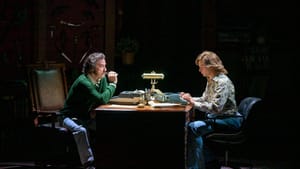Stay in the Loop
BSR publishes on a weekly schedule, with an email newsletter every Wednesday and Thursday morning. There’s no paywall, and subscribing is always free.
Well-deserved screams for the stage
Resident Ensemble Players presents Ira Levin’s Deathtrap

Suspenseful thrillers abound on screens big and small, but there’s nothing quite like the screams of a live theatrical audience. In Newark, they can be heard nightly, generated by Resident Ensemble Players’s (REP) dandy, perfect-period, quite scary production of Deathtrap.
Helming a cast of five seasoned REP actors, Michael Gotch (often onstage but here in the director’s chair) has crafted a satisfying production of this classic that interlocks like a mad puzzle and has the precision (and pop-up surprises) of a cuckoo clock. Like farce or commedia dell’arte, the thriller genre has a specific set of requirements—snappy timing, a sense of menace, and the ability to keep the audience guessing—and Gotch’s production hits every mark.
This 1978 play-within-a-play was written by novelist, screenwriter, and playwright Ira Levin, whose chilling oeuvre includes Rosemary’s Baby, The Stepford Wives, and The Boys from Brazil. Here, he turns the tables on himself, filling his clever mystery script with meta-insider theatrical and publishing references and some startling stagecraft.
The spoiler-free premise
As the show opens, successful suspense playwright Sidney Bruhl (Lee E. Ernst) has run out of income-generating ideas. Writer’s block has plagued him for so long that creditors will soon be circling; he and his devoted wife Myra (Elizabeth Heflin) have been living on her funds. Suddenly he’s sent a first-rate mystery script titled Deathtrap that could solve everything. The play-within-the-play, with its single set and five characters (just like the one we see onstage) was written by Clifford Anderson (Mic Matarrese), one of Sidney’s seminar students.
The experienced playwright invites Clifford over to “fine-tune” the work, though he knows it’s pretty much perfect, as he and Myra consider how the script might resuscitate his floundering career. Their machinations are complicated by the fact that famous Dutch psychic Helga ten Dorp (Kathleen Pirkl Tague) is renting the house next door. And in the second act, Sidney’s lawyer Porter Milgram (Stephen Pelinski) arrives to muddle matters just a little further. That’s it for plot details. Absolutely no spoilers: from here on, you’ll have to see the show.
Fun for the company (and us)
The onstage company is clearly having a great time, something that infects the audience as well. Ernst has Sidney’s puffery and ego well-defined, though he leans heavily on the frustration and fear that this is the end of a lucrative career with its addictive adulation and best-table-at-Sardi’s status. And some of the manipulative writer’s conniving charm is missing.

Matarrese, perfect in period flared jeans (Jo Fulmer’s costumes) and a floppy 70s hairdo (a great wig by Denise O’Brien) oozes a naivete that may (or may not) cover a raging ambition to eclipse his mentor. As always, the REP players swirling around these two are equally matched. Heflin is the helpful but oft-confused spouse. (With good reason?) Pirkl Tague delivers a spot-on combination of comic psychic insight and no-nonsense advice (Madame-Arcati style). And Pelinski’s character is perfectly described by Sidney: “He’s sharp—dull, but sharp.”
Designing a dark and stormy night
Gotch keeps this excellently staged black comedy, and his actors, perfectly balanced on a satire/suspense knife-edge. Stephanie Hansen’s setting—a renovated stable in the spooky Connecticut woods—is decorated with plenty of actual knives, as well as maces, truncheons, and guns. Hovering overhead are the huge theatrical posters that attest to Sidney’s ego, and in suspenseful moments (of which there are plenty), they feature peering eyes that glow malevolently under Eileen Smitheimer’s moody lights. But in this brooding forest setting, those lights can be a little too moody; sometimes, it’s a challenge to see the actors clearly.
Joanna Lynne Staub has created an extremely witty sound design, where the requisite thunder, lightning, rain, and howling winds are underscored by recognizable scary-music snippets that enhance the mood while generating the quirky comfort of recognition.
A blessing from the Pope of Thrills
Audiences have always loved plays like these—Dial M for Murder, Wait Until Dark, Dracula—that tap into our pervading fears and then provide resolutions that soothe and satisfy. Stage thrillers aren’t being written as often as they once were, but audiences continue to love them, and among that echelon, Deathtrap rates very high indeed. Tony-nominated, it had the longest Broadway run of any play of its genre (1,800 performances over four years) and it was made into a 1982 hit movie starring Michael Caine and Christopher Reeve.
In his director’s notes, Gotch quotes Stephen King (“as close to the Pope of Thrills as we have”) who said that Levin is “the Swiss watchmaker of plot.” And that he is. Though it runs well over two hours, Deathtrap flies by, packed with red herrings and Easter eggs dished up in an old-fashioned melodramatic meal that’s deliciously satisfying, and just as deliciously devious.
Know before you go: this production includes theatrical haze, strobe lighting, gunshots, violence, and profanity.
What, When, Where
Deathtrap. By Ira Levin, directed by Michael Gotch. $30-$39 (discounts available for students, seniors, and UD faculty and staff). Through April 28, 2024, at Roselle Center for the Arts’s Thompson Theatre at the University of Delaware, 110 Orchard Road, Newark. (302) 831-2204 or rep.udel.edu.
Accessibility
Roselle Center for the Arts is ADA-compliant and equipped with a hearing loop system that works with hearing aid t-coils, cochlear implants, and in-house hearing devices. For wheelchair and seating requests, call (302) 831-2204 or email [email protected].
Sign up for our newsletter
All of the week's new articles, all in one place. Sign up for the free weekly BSR newsletters, and don't miss a conversation.

 Gail Obenreder
Gail Obenreder